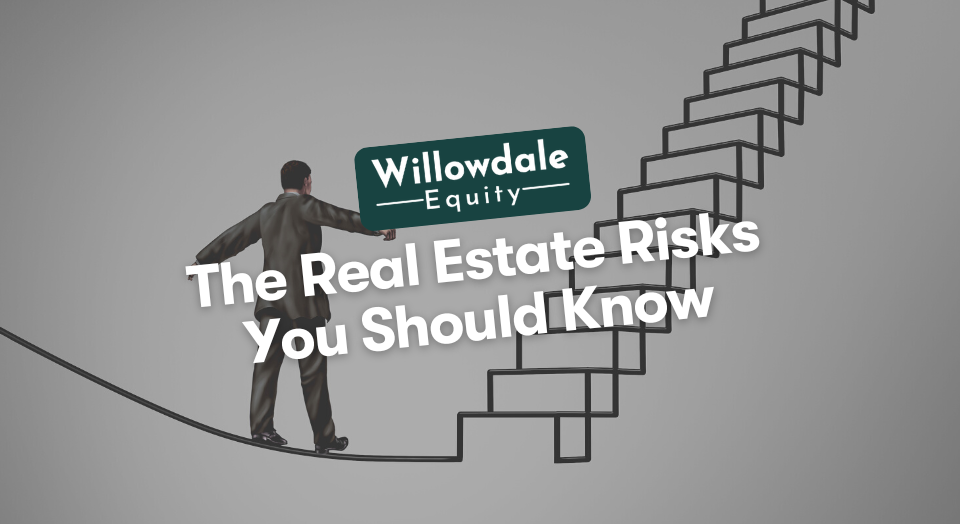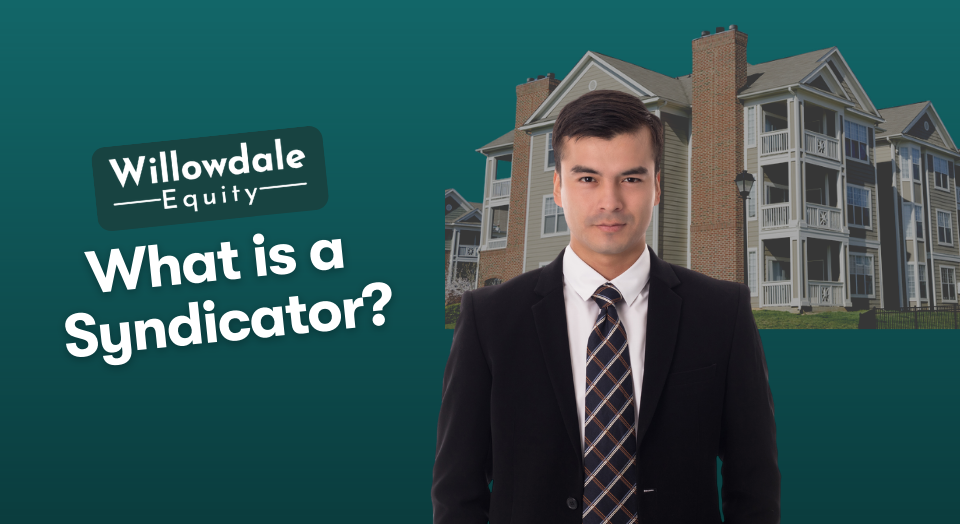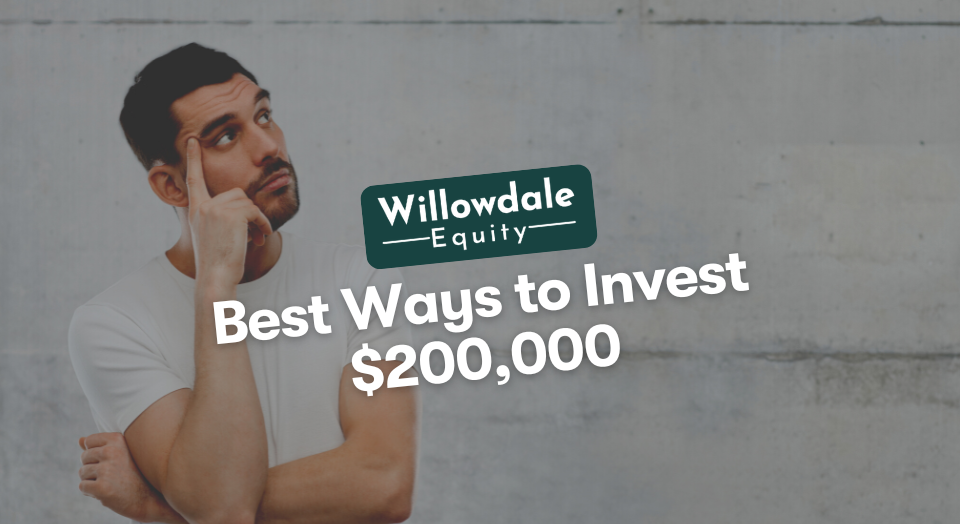
The 7 Real Estate Risks You Should Know About
This article is part of our guide on how to invest 1 million dollars for income, available here.
The real estate market is an excellent place to invest, but some risks are involved. Whether you’re purchasing a home or investing in real estate for business, there are many real estate investment risks to consider before making your final decision.
Before worrying about the difficulties associated with real estate investing, consider which approach you’re using first. Real estate investors focused on flipping houses, for example, may not be concerned about any potential hazards related to poor renters since their investment property might be purchased vacant, undergo a complete renovation, and then put on the market for sale without having to deal with any of the various risks caused by bad tenants.
On the other hand, rental property owners may not be worried about hiring the wrong contractor since their purchase might include minimal renovations. The rental property investor may also not be as concerned about buying below market value as they’re investing for the long term and will likelyfocus mores on the market fundamentals while picking their investment property location.
Key Takeaways
-
Ensure the hiring of a contractor with an excellent reputation, good reviews, testimonials, and proper licensing credentials before taking them on board for real estate renovations or repairs.
-
By not researching the actual condition of the property you want to buy, you might find yourself in a situation where you have to spend more money, time, or, more realistically, both than you anticipated.
-
For a rental strategy to work, you must be in a place with many potential tenants and evidence that you’ll be able to lease your property quickly. In many cases, areas that are good for flipping can also be suitable for rentals, but they don’t always go hand in hand.
-
Some markets fluctuate wildly, which could cause problems for homeowners who want to sell their investment properties later. A market with erratic swings is another significant risk for real estate investors.
7 Real Estate Investment Risks:
Several core factors add risk to any piece of real estate. We’ve put together this list of seven real estate investment risks that every investor should know about before they invest their time, money, or energy into any real estate investment type. They are as follows:
- Hiring the wrong Contractor
- Real Estate Investors Not Doing Enough Property Inspections
- Location of Your Real Estate Investments
- Unstable market
- Risk of bad tenants
- Disasters – floods, fires, earthquakes, etc.
- Disagreements with neighbors
1.) Hiring the wrong Contractor
If you aren’t transparent with what work is included or not included in your contractor’s estimate, or you get misaligned with the materials used, it can cost you a ton of money. You also need to ensure that you’re hiring someone with an excellent reputation, good reviews, testimonials, and proper licensing credentials before taking them on board for real estate renovations or repairs.
One of the best ways to find someone like this is by asking your realtor if they know reliable contractors. Contractors that make repairs on behalf of their client’s properties before they sell are frequently involved with real estate agents, so they can often point you to the ones they know of and trust. Another great way to find reliable contractors is by using websites like homeadvisor.com.
Getting Estimates
Once you select your contractor, you should ask them for a detailed estimate broken down into all tasks and materials. There should be no hidden costs or surprises when the work begins, and timelines should be discussed beforehand to reduce the odds of a dispute.
This is one of the most severe risks you can face as a real estate investor. It’s an absolute nightmare to figure out what went wrong after the fact, and it will probably be too late to do anything about it. This is why, before starting any remodeling projects, you should always ensure you are well aware of this risk. It could make or break your investment property.
2.) Real Estate Investors Not Doing Enough Property Inspections

By not researching the actual condition of the property you want to buy, you might find yourself in a situation where you have to spend more money, time, or, more realistically, both than you anticipated.
Contractor Inspections
You may avoid this problem by calling up some contractors who service that area and having them visit the property for their inspection. Ask them to provide a written quote, which will require them to closely examine various parts of the structure, including the roof, foundation, and HVAC system.
It is essential to not rely on any contractor when deciding. It is better to be informed of the actual status of the property by consulting multiple contractors. The more opinions you can get, the more informed you will be.
Professional Property Inspector
Another way you can understand the actual condition of the residential rental property is by getting a professional inspection done. You can do this before making an offer, or if you submit a request with an inspection contingency, you should do it before waiving your inspection condition.
You have to keep in mind that some types of issues may be hidden. In extreme situations, you could buy an utterly worthless property, leading to bankruptcy. If this happens, it can cost you a lot more than expected and might make your renovation project over budget.
3.) Location of Your Real Estate Investments
Location is definitely everything in real estate, but each investor’s personal goals, return expectations, and real estate strategy will alter the definition of a “good location.” For those flipping real estate, it’s essential to purchase under market value and in highly desirable locations where most homes are sold quickly. Looking at sold comparable homes days on the market (known as DOMS), or how long it took to sell, can be a great way to see if you’re in an area where people want to be.
Location for Rental Strategy
For a rental strategy to work, you must be in a place with many potential tenants and evidence that you’ll be able to lease your property quickly. In many cases, areas that are good for flipping can also be suitable for rentals, but they don’t always go hand in hand. The main risk associated with investing in the wrong location is that you’ll have difficulty selling or leasing to tenants.
It’s also important to look at the long-term potential of the market you’re investing in if you are planning on holding the investment property. If it isn’t in an area where people want to live or travel, there is a significant risk involved with investing in this type of real estate since its value may never increase and could even decrease over time.
Every Property is Unique

In addition to selecting the right area, it’s essential to understand that every single lot is unique to one. Just because a similar home a few streets away sold for a specific price or achieved a particular rent does NOT mean that your property will.
The value of a piece of property is also determined by the immediate environment in which it sits. Busy streets, cemeteries, parking lots, or garbage dumps are just a few examples of things that can directly impact the real estate in the immediate vicinity.
This is why do your research when looking for real estate investment opportunities. Check out real estate reports and real estate trends by neighborhood. This way, you’ll know what is happening in the area before you get too involved financially.
4.) Unstable market
Some markets fluctuate wildly, which could cause problems for homeowners who want to sell their investment properties later. A market with erratic swings is another significant risk for real estate investors. If the real estate market in your region is volatile, you don’t want to pay too much for a home and then not be able to sell it later because real estate values have dropped dramatically. This is why real estate investors should try to buy investment properties in areas with steady growth.
In most cases, if you hold any property long enough, you will be able to sell it for more than you paid, but certainly not always. It would help if you were careful when investing in markets with a history of booming and busting and ensuring you’re prepared for the risks that come with it.
The real estate market is constantly on the move, making it difficult for investors to decide when they should sell their investment properties. This is why real estate investing in a market where prices are volatile is not recommended unless you have some system to deal with real estate risk when it happens. It’s best to invest in markets where home values increase steadily, so your real estate investment isn’t left hanging, and your returns are more predictable.
5.) Risk of bad tenants
Bad tenants are one of the most significant risks you should be aware of when investing in real estate. Not screening your tenants carefully enough could mean trouble for your investment property and can even come with legal consequences if it becomes a big problem.
Make sure to research what kind of tenant will most likely rent your parcel before signing any lease agreements. A bad tenant is usually bad for real estate investments for two main reasons. It’s either because of nonpayment or because of damage. The worst tenants are guilty of both.
Screening Tenants

With proper screening, you can drastically lower the chances of having bad tenants, but you can never be sure that you’ve picked the right ones. No matter how much you try, there will always be a chance something happens, for instance, if your renter loses their employment and finds themselves in a bind with no way to pay the rent.
Mitigate Risk With Multi-Unit Real Estate
You can also mitigate this risk by having more tenants by buying multiple units of real estate. If you have more tenants, they are drastically lower chances of being wrong.
For example, imagine you have a single-family house that you can only rent out to one tenant. If that tenant didn’t pay their rent down the road for some unforeseen reason, you would have lost 100% of your potential rental income. But, if you had a four-unit property, you could still collect rent out of the other three units and likely be able to easily cover your expenses like mortgage payments, property taxes, insurance, and utility bills. The rental loss for the four-unit property would be far less significant compared to the single-unit home.
Related Read: Safest Investments With The Highest Returns
6.) Disasters - floods, fires, earthquakes, etc.
Another real estate risk that you should be aware of is disasters such as fires, floods, and earthquakes. All real estate can, at some point, become damaged by a force of nature which could affect the property’s value if it has been significantly altered from its original state.
A real estate investor considering their real estate investment’s geographical and environmental safety should consider purchasing a rental property. It might even be best to look for rental properties further away from the disaster zones. It’s also important to note that even if a natural disaster doesn’t affect you directly, consider how the real estate market will react after such an event since this can also contribute to real estate risk.
7.) Disagreements with neighbors
This can be one of the most unforeseen risks out there. Chances are you don’t already and won’t get the opportunity to know your neighbors very well before you buy. You must be aware that real estate risks can also come from disagreements with your neighbors. Sometimes property values can be affected by what is happening on neighboring properties which you might not have much control over (such as noise or pollution).
This real estate risk is even more pronounced if the area you’re looking to invest in has a higher-than-average crime rate, so it should be considered.
Frequently Asked Questions About Real Estate Investment Risks
Real estate investments aren’t necessarily high risk, but they can be if you lack experience. It’s been the backbone of many people’s retirement, and many factors go into deciding whether a piece of property should be considered a good investment. Also, depending on how a rental property is financed, the loan terms(if you have one), and several other factors, the actual risk or real estate varies quite drastically from low to high.
Although there are many risks associated with real estate investing, the four main risks are hiring the wrong contractor, selecting the wrong location, bad tenants, and lack of amble property inspection. Be aware of these risks when you look to invest in real estate so that you don’t find yourself stuck in a bad situation with no real solutions.
Real Estate Risks - Conclusion
The real estate market is an excellent place to invest, but there are some risks to be aware of. Whether you’re purchasing a home or investing in real estate for business purposes, there’s plenty of real estate investment risk and opportunity at play. Before buying the property or starting a real estate investment portfolio with any particular asset class, be sure that you know the seven significant risks we’ve outlined here – they may change how you approach your future investments!
Interested In Learning More About PASSIVE Real Estate Investing In Multifamily Properties?
Get Access to the FREE 5 Day PASSIVE Real Estate Investing Crash Course.
In this video crash course, you’ll learn everything you need to know from A to Z
about passive investing in multifamily real estate.
We’ll cover topics like earned income vs passive income, the tax advantages, why multifamily, inflation, how syndications work, and much much more!




